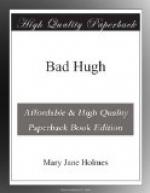It seemed too great a joy to be true, and by way of reassuring himself he had to look often at the crowds of people hurrying by, and down upon old Sam, who, in full dress, with white cotton gloves drawn awkwardly upon his cramped distorted fingers, stood by the carriage, bowing to all who passed, himself the very personification of perfect bliss. Sam was very happy, inasmuch as he took upon himself the credit of having made the match, and was never tired of relating the wondrous story to all who would listen to it.
“Massah Hugh de perfectest massah,” he said, “and Miss Ellis a little more so;” adding that though “Canaan was a mighty nice place, he ’sumed he’d rather not go thar jist yet, but live a leetle longer to see them ’joy themselves. Thar they comes—dat’s miss in gray. She knows how’t orange posies and silks and satins is proper for weddin’ nights; but she’s gwine travelin’, and dat’s why she comed out in dat stun-color, Sam’ll be blamed if he fancies.” And having thus explained Alice’s choice of dress, the old negro held the carriage door himself, while Hugh, handing in his mother, sister and his bride, took his seat beside them, and was driven to the church.
Twenty minutes passed, and then the streets were filled again; but now the people were going home, talking as they went of the beauty of the bride and of the splendid-looking bridegroom, who looked so fondly at her as she murmured her responses, kissing her first himself when the ceremony was over, and letting his arm rest for a moment around her slender form. No one doubted its being a genuine love match, and all rejoiced in the happiness of the newly-married pair, who, at the village depot, were waiting for the train which would take them on their way to Kentucky, for that was their destination.
In the distracted condition of the country, Hugh’s presence was needed there; for, taking advantage of his absence, and the thousand rumors afloat touching the Proclamation, one of his negroes had already run away in company with some half dozen of the colonel’s, who, in a terrible state of excitement, talked seriously of emigrating to Canada. Hugh’s timely arrival, however, quieted him somewhat, though he listened in sorrow, and almost with tears, to Hugh’s plan of selling the Spring Bank farm and removing with his negroes to some New England town, where Alice, he knew, would be happier than she had been in Kentucky. This was one object which Hugh had in view in going to Kentucky then, but a purchaser for Spring Bank was not so easily found in those dark days; and so, doing with his land the best he could, he called about him his negroes, and giving to each his freedom, proposed that they stay quietly where they were until spring, when he hoped to find them all employment on the farm he went to buy in New England.




